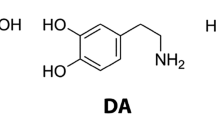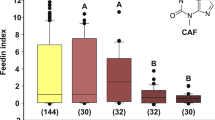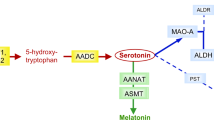Abstract
RECENTLY, Erspamer1 has reported that the urine of adult rabbits, guinea pigs and horses contains no detectable 5-hydroxyindoleacetic acid, which is found in the urine of men, dogs and rats as an important metabolic product of endogenous serotonin. He has suggested that in adult herbivores the metabolic pathway for serotonin may differ from that in carnivorous and omnivorous mammals. We have therefore investigated whether oxidative deamination is only the first step of a more radical breakdown process, which may even involve the rupture of the indole ring.
This is a preview of subscription content, access via your institution
Access options
Subscribe to this journal
Receive 51 print issues and online access
$199.00 per year
only $3.90 per issue
Buy this article
- Purchase on Springer Link
- Instant access to full article PDF
Prices may be subject to local taxes which are calculated during checkout
Similar content being viewed by others
References
Erspamer, V., J. Physiol., 127, 118 (1955).
Weisbach, H., Redfield, R., and Udenfriend, S., J. Biol. Chem., 229, 953 (1957).
Blaschko, H., and Hellmann, K., J. Physiol., 122, 419 (1953).
Author information
Authors and Affiliations
Rights and permissions
About this article
Cite this article
NAKAI, K. Serotonin Metabolism in Herbivores. Nature 181, 1734–1735 (1958). https://doi.org/10.1038/1811734a0
Issue Date:
DOI: https://doi.org/10.1038/1811734a0
Comments
By submitting a comment you agree to abide by our Terms and Community Guidelines. If you find something abusive or that does not comply with our terms or guidelines please flag it as inappropriate.



